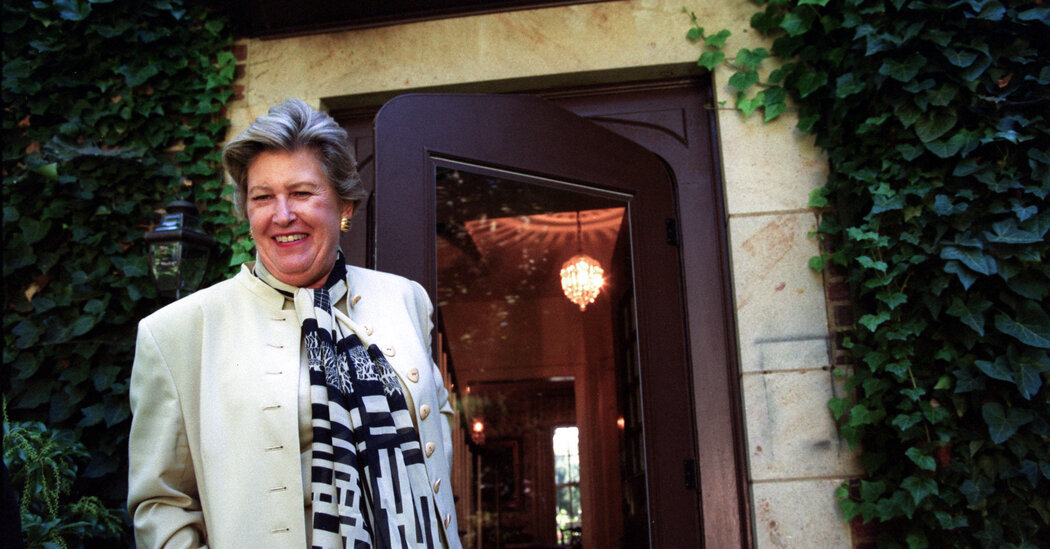She had to quit the foreign service to marry. But she was reinstated 16 years later, when female employees challenged the department’s sexist traditions, and she thrived.
Phyllis Oakley, whose 25-year diplomatic career in the State Department almost didn’t happen because of an unwritten rule that forbade female foreign service officers from marrying, died on Jan. 22 at a hospital in Washington. She was 87.
Her son, Thomas Oakley, confirmed the death. He said that she had been in good health but “her heart just stopped.”
In the late 1980s, as the Cold War waned, the straight-talking, forthright Ms. Oakley, whose boisterous laugh often signaled her presence, was much in the public eye as deputy spokesman (the term then in use) for the State Department under President Ronald Reagan. She later became assistant secretary for refugees and assistant secretary for intelligence and research under President Bill Clinton.
She had begun her career in 1957. But when she married in 1958, State Department custom dictated that she quit.
In the late 1960s and early ’70s, as women started breaking down barriers in other professions, the handful of female officers in the foreign service challenged this and other antiquated notions that discriminated against them. The department gave way on the unofficial marriage ban in 1974, allowing women to marry and offering to reinstate those who had been forced out earlier.
By then, few of those who had left wanted to return. But Ms. Oakley did. She had spent the intervening 16 years as the wife of a foreign service officer, Robert B. Oakley, carrying out the myriad social, diplomatic and managerial duties that the department expected of wives under its “two for the price of one” motto. She also raised their two children.
Once she was reinstated, she and her husband became one of the foreign service’s earliest so-called tandem couples, camping and decamping all over the world — sometimes with each other, sometimes without.
Phyllis Elsa Elliott was born on Nov. 23, 1934, in Omaha. Her mother, Elsa (Kerkow) Elliott, taught high school math and chemistry. Her father, Thomas M. Elliott, was a salesman for the Rawlings Sporting Goods Company; his promotions took the family to Columbus, Ohio, and to St. Louis.
Phyllis was always interested in public affairs; she received material from the State Department about job opportunities when she was 12. During World War II, she followed the battles closely, enthralled with history and geography.
At Northwestern University, she majored in political science and graduated Phi Beta Kappa in 1956. She received her master’s degree from the Fletcher School of Law and Diplomacy at Tufts University in 1957 and then joined the foreign service.
She was completing her French language training and waiting for her first overseas assignment when she met Bob Oakley, another young officer in training. They decided to marry, knowing full well that her career would be over before it began.
“We accepted that discrimination without batting an eyelash,” she said in a 2000 oral history for the Association for Diplomatic Studies and Training.
Mr. Oakley was sent to Sudan in May 1958. The young couple were married in a registrar’s office in Cairo in June, then began their lives together in Khartoum.
His next posting was the Ivory Coast. Then he was sent to Vietnam, where families were not allowed to follow. Ms. Oakley and the children spent that time in Shreveport, La., where her husband’s family lived, and she taught American history at Centenary College. She later attributed her desire to rejoin the foreign service in part to the joy she had found in teaching.
“It was nice to discover I still had a brain that I could use,” she said in the oral history.
After Mr. Oakley left Vietnam in 1967, the family reunited and moved to Paris; then New York, where he worked at the United Nations; then Beirut, where they lived until 1974.
That was the year the State Department dropped its ban on married women, and Ms. Oakley was reinstated, in Washington. Her specialties included Arab-Israeli relations and the Panama Canal Treaty.
When her husband received his first appointment as ambassador, to Zaire in 1979, Ms. Oakley went with him, but as an employee of the United States Information Agency and not under his direct purview. It marked the first time a wife had worked in her husband’s mission.
He next went to Somalia in 1982. Instead of joining him there, Ms. Oakley returned to Washington and rose to a midlevel job on the Afghan desk. Secretary of State George P. Shultz spotted her talking about Afghanistan on “The MacNeil/Lehrer NewsHour” one night and was so impressed that when an opening arose, he named her the department’s deputy spokesperson. She was the first woman in the job and became a widely recognizable figure delivering televised briefings.
She held the job from 1986 until 1989, when her husband was appointed ambassador to Pakistan. They did not want to be separated again, so she took a job in Islamabad at the United States Agency for International Development, which ruffled some feathers.
“I think everyone acknowledged that I might know more about Afghan politics than anyone else in the mission,” she said in the oral history, “but there was the feeling that as the ambassador’s wife, I was being foisted on them.”
After she retired from the State Department in 1999, she taught at the Johns Hopkins School of Advanced International Studies, at Mount Holyoke College and at Northwestern.
In addition to her son, Ms. Oakley is survived by her daughter, Mary Kress, and five grandchildren. Her husband died in 2014.
At the end of her oral history, Ms. Oakley considered what might have happened if she had not been sidelined in the 1950s, or if she hadn’t married.
“I think I would have had a good career,” she said, “but I don’t think it would have been as rich and rewarding.”


























